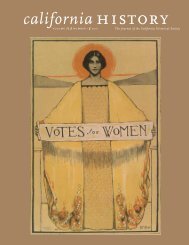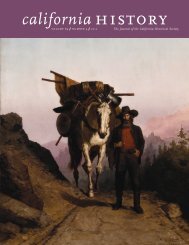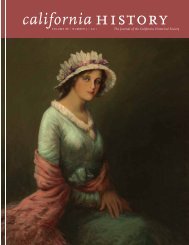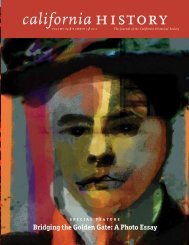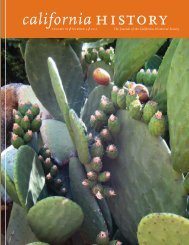Volume 90, Number 1 - California Historical Society
Volume 90, Number 1 - California Historical Society
Volume 90, Number 1 - California Historical Society
Create successful ePaper yourself
Turn your PDF publications into a flip-book with our unique Google optimized e-Paper software.
38<br />
<strong>California</strong> fought each other or the Americans in<br />
1846, war lacked the sense of annihilation that<br />
inflamed the spirit.<br />
Only battles against infidels required the services<br />
of pious warriors. When Father Palóu spoke<br />
about the establishment of Mission San Diego<br />
in 1769, he declared that “exactly as through the<br />
power of that sacred emblem the Spaniards had<br />
gained a great victory over the barbarous Mohammedans,<br />
in the year 1212, they [i.e., the priests]<br />
might also win a victory by raising the standard<br />
of the Holy Cross, and putting to flight all the<br />
army of hell, [and] bring under the subjection to<br />
the gentle yoke of our Holy Faith all the savage<br />
tribes . . . who inhabited . . . <strong>California</strong>.” Later,<br />
when Indian converts rebelled at Mission San<br />
Diego in 1775, Palóu praised a “blacksmith [who<br />
surpassed all other Spaniards in the fight] for<br />
without a doubt the Holy Communion which he<br />
had just received filled him with extraordinary<br />
courage and though he had no leather jacket to<br />
protect him he went out among the houses and<br />
shacks crying out, ‘Long live the Faith of our Lord<br />
Jesus Christ, and let these dogs of enemies die<br />
the death.’” 76 When Bouchard raided settlements<br />
along the coast, Father Mariano Payeras, rector<br />
of Mission La Purísima Concepción, used terms<br />
that echoed the Muslims’ willingness to fight<br />
and die for their faith, writing: “Long live God,<br />
long live [our Catholic] religion, long live the<br />
king, long live the fatherland [in whose] precious<br />
defense we will conquer or die.” 77<br />
The settlers used similar terms. Luis Arguello,<br />
when describing an expedition to recover fugitive<br />
neophytes, reported to the governor that he had<br />
confronted “heathen overwhelmed with error”<br />
whom God “has placed under the conquering<br />
banner of the most Catholic and pious monarch.”<br />
In the interest of “propagating our holy religion,”<br />
Arguello announced, “I am ready to sacrifice<br />
my comfort and my life and all the power of my<br />
mind.” 78 When troops marched from Los Ange-<br />
<strong>California</strong> History • volume <strong>90</strong> number 1 2012<br />
les to pursue the Indians who participated in the<br />
Chumash rebellion, they serenaded each member<br />
of the expedition with such lyrics as “Sergeant<br />
Carlos, who for the Trinity, dressed for war.” 79<br />
But above all, the shadow of ribat lingered. It<br />
bears repeating that the legacies of ribat dwelled<br />
beyond memory. Nonetheless, the strategies and<br />
ideas of ribat provided lessons that Christians in<br />
Spain did not find in their own doctrines. After<br />
borrowing and then changing certain elements<br />
to reduce any reference to Islam, Christians<br />
reimagined ribat as a religious exercise that<br />
could include the warrior’s labors in battle. In<br />
<strong>California</strong>, the image of the warrior and pilgrim<br />
conflated into one personage, thereby bequeathing<br />
to believers a repertoire of behaviors that<br />
could sanctify the most violent deeds. When<br />
enemies lurked, who, for the most part would<br />
be Indians, the priests and settlers also found<br />
the opportunity to abolish the sin and imperfection<br />
that engulfed their hearts. Like Spanish<br />
Christians centuries before, <strong>California</strong>’s warriors<br />
believed that for the duration of their quest, the<br />
slaying of enemies would serve as penance or<br />
professions of worship.<br />
And so they marched. In 1806, when describing<br />
an expedition to pursue fugitive neophytes,<br />
Father Pedro Muñoz wrote in his diary that<br />
on the first day the men set out, they “were<br />
informed in a formal address of the purpose<br />
toward which God was guiding them in the present<br />
expedition and the merit they would acquire,<br />
if following the Voice of God as transmitted<br />
through their chief, they fulfilled their duty.”<br />
Twenty years later, Sergeant José Dolores Pico<br />
said of another expedition that the men “recited<br />
the rosary” at least twice during their hunt for<br />
fugitive neophytes. The rosary, whose prayers<br />
include multiple recitations of the “Hail Mary”<br />
where believers ask the “Mother of God to pray<br />
for us sinners,” testified once more to the penitential<br />
qualities of a military effort. 80



